Believe it or not, Love Live! (LL) is a bigger multimedia franchise than you'd think, spanning several instalments telling different stories about varied groups of characters. While the series is largely still more popular over in Japan than the west, there's no denying that there's still a cult following amongst its English fanbase.
Recently, however, 2025 has shaped up to being a time of departure for the series. One of the franchise’s more popular groups, Aqours, recently announced the graduation concert of its real-life group of actors, implying the end of their activities as a group together once the concert finishes. Bluntly put, means that in the future, we'd be receiving far less Aqours projects, resulting in the group slowly forming a fading presence over time.

Meanwhile, the series’ real-time story group, Hasunosora, have finally committed to their storyline in a rather unexpected way, through saying goodbye to their primary Third Year characters, Kozue, Tsuzuri, and Megumi. Notably, the implication here is that these characters would no longer participate in Hasunosora’s story from now on.
Naturally, it's been a difficult time for fans of the series. Even with the recent resurgence of Love Live!'s Bluebird project expectations have gone awry as the future of the series begins to look questionable at best for some fans.
Even so-
I want to look at these new circumstances from a new light:
To build the point I want to make, I'm aware that I'll need to delve towards my personal experiences regarding this series. I got into Love Live! initially at a time when not much was going on in my life. To me, the series was comforting, but not much more than that.
A couple of years passed, suddenly I was faced with a lot of changes in my personal life, forcing me to struggle towards adapting a new perception of the world around me due to the sudden changes I was going through. Coinciding that, was also the period in which I, on a whim, watched Love Live! Sunshine!.
It was probably incredibly fortunate timing, but Sunshine's core introspective themes had hit me harder than I feel it would've before. Suddenly, I'd began to appreciate the series for more than it's silly situations, incredible discography and light-hearted humour. I noticed a common patterns throughout Love Live!'s stories, and began interpreting the series as a whole entirely differently. Eventually, it made me come to an undeniable conclusion…
The Love Live! franchise has always been a coming-of-age tale!
Of course, you likely now see where I'm going with this. Even so, I wanted to write this article regardless, because I felt that it would do the job far more sincerely than a thread of tweets on Twitter could manage. At least here, I wouldn't suffer the likelihood of the Twitter algorithm sludging me over after drowning my post from never being seen again to the common-person.
In this article: I want to write about Love Live!’s constant theming of moving forwards, how each group’s story handled growing up differently, and why I think we shouldn’t be afraid of the new changes that the series often encourages and enforces - but instead be open to the possibility of something new entirely. To do that, I’d like to start explaining my analysis from the very beginning...
μ’s and their constant presence
There's a lot of interesting lore regarding μ’s' (pronounced, "muse", by the way) early beginnings. I could cover a lot of ground, including their initially sparse reception from their first song selling only roughly 430 copies, to the group’s eventually larger success after the School Idol Project! anime (SIP) aired.
Instead of talking about any external contexts, however, I want to discuss the relevance μ’s had on the series as a whole, alongside how the anime only continued carrying their core presence moving forwards, despite their 2016 retirement.

SIP tells the story of an aspiring, yet up-beat girl, Honoka. After learning that her school, Otonokizaka, is due to be shut down as a result of its declining popularity, Honoka assembles her friends, Umi and Kotori, to think of a way to save it. The three of them eventually realise that the quickest way to prevent their school from closure would be through participating and winning Love Live!, A national tournament held all over Japan cantering towards the performance of school idols. If Otonokizaka's school idol group, μ’s, can earn enough recognition from winning, then the school might have a chance of gaining enough applying students to save it from imminent closure.
The anime’s two seasons tell the struggles of Honoka and her friends, in their journey to win Love Live!. During which, she recruits a myriad of characters to join her group, forming long-lasting friendships with each of them as a result. Still, what comes after victory?
This is a question that SIP’s second season eventually touches on, but is later expanded much more through the anime’s film continuation, the School Idol Movie.

In the film, Honoka and μ’s choose to delay their group’s departure, instead performing within the bustling streets of New York. After accomplishing their wish to promote the joys of school idols for a worldwide audience, the group are hit with sudden trouble as their rocketing popularity interrupts their daily life.
After which, Honoka is presented with a harsh decision. With the school graduation of the Third Year characters approaching, the discussion of whether to continue μ’s grows more relevant. Honoka, just like everyone else at μ’s, cherishes the memories the girls made during their time spent together, but with the Third Years no longer being present, it brings the subject into focus on how a μ’s without them would function.
Honoka and the girls eventually come to agreement that μ’s without its nine members wouldn’t feel like the group at all. With this decided, they agree upon disbanding. To begin with, they’d already accomplished their initial goal of saving their school. All that would be left would be to vanish, as if they never existed at all. The film’s finale sees the girls having one final live performance, eventually concluding on an open ending.
Once performances ends, the credits roll. Even 10 years later, it’s never been openly shown where the grown up members of μ’s are. Just like that, Honoka and her friends' presence in the franchise vanished, but it was never forgotten.
Put bluntly, the Love Live! franchise wanted μ’s' to be exactly that. They were a “one-year wonder”, inspiring those around them to continue their love of school idols, while simultaneously vanishing from the limelight when nobody took notice.
This brings us to the series’ next instalment, where things take a seemingly similar, yet unexpectedly different turn…
Unlike School Idol Project, Aqours' story is a direct juxtaposition:
At a glance, SIP’s successor, Love Live! Sunshine!, may seem like it's following SIP’s roots.
The story centres protagonist, Chika, who wants to begin her own School Idol Club group in the hopes of following the footsteps of μ’s. However, upon learning that her school, Uranohoshi, is due to be shut down as a result of a lack of applicants, Chika takes this as an opportunity to be just like her role models. Hoping to save her school from closure just like μ’s did, Chika and her friends enrol their group, Aqours, in the next Love Live! competition, in the hope of raising the school's popularity to form more prospective student applicants to prevent the school from closure.

The show pays many homages to the original series early on. One of the most notable forms of this comes from Episode 12 of Season 1, where Aqours’ stop by μ’s’ school to pay respects to them during their return trip to Tokyo.
When talking to nearby students, Chika learns that upon graduating and leaving their school, μ’s decided to take all their trophies and awards from display. This was done to allow for μ’s' presence to fade over time, ensuring that future school idol groups wouldn’t be stuck imitating their success without first trying something new. Upon learning this, Chika has a lot to think about when it comes to her leading role of Aqours, alongside where she stands in the world to begin with.
In their story’s early beginnings, Sunshine places a heavy emphasis on Aqours following μ’s' footsteps. Even so, the cards are set against them. With the girls’ hometown, Numazu, being fairly far off for most to reach, the school suffers gaining any traction, even with Aqours’ performance at Love Live!.
When the school isn't able to reach its projected 100 prospective student applicants, it’s with heavy hearts that Chika and her friends are forced to accept Uranohoshi’s closure.
Even so, when facing defeat, the Love Live! competition stands strong, still urging for someone to take victory. It's then that Chika realises Aqours' place in the world. They were never μ’s to begin with, but they could be something else entirely.
Aqours doesn't need to save their school to prove themselves. Unlike μ’s, Chika began her school idol club out of love for the craft. Just like that, she intends to win Love Live!, not to save her school, but to - at the very least - cement a name for Uranohoshi as a whole.
The final episode of Sunshine’s second season sees Chika and her friends cleaning their school before it finally shuts, eventually bidding the gates goodbye with one final push.
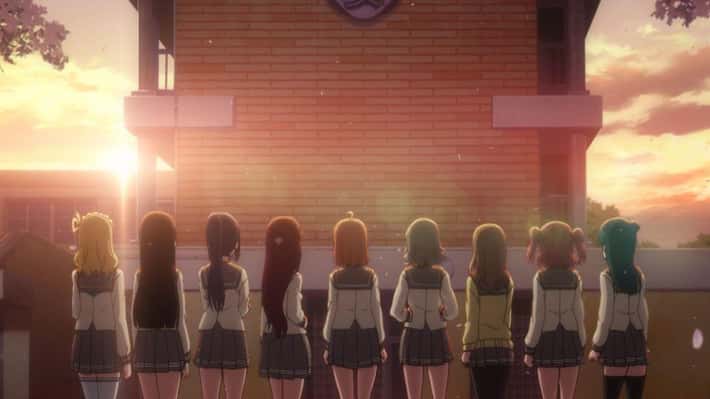
Already, this ending was far different to SIP’s story, showcasing a theme of acceptance and continued pursuit. The reason Chika’s journey differed from Honoka’s was because she had to accept that she couldn't change her life to reflect the outcome she wanted. In the end she had to make the most of what was given to her.
It was later that Sunshine’s sequel film, Over the Rainbow, expanding upon this core theme. Over the Rainbow explores Chika and her friends trying to continue Aqours after the inevitable graduation of their Third Year members. Unlike μ’s, who chose to disband entirely, the remaining girls of Aqours want to continue the group's legacy in spite of their circumstances.

The film capitalises on the core theme of Aqours, as a group, being eternal - despite their circumstances. Chika and her friends come to realise that even without their seniors, they're still able to pull off the same level of magic they'd done before.
Adding to this, the film’s post-credits scene further cements their identity. The scene sees two unnamed students discussing what to name their group. In quick haste, they carve the name, “Aqours”, on sand, choosing to call their group that very same name.

There are plenty of interpretations you could arrive to when looking back at this scene. To me, though, this scene once utters the concept of Aqours’ legacy once more. They're direct juxtapositions of μ’s. Rather than wanting to fade away from public view after inspiring those around them, Aqours chooses to stay eternal, regardless of the changing world around them.
Superstar, Liella! & Growing Up:

Continuing on from here, is the story of Liella!. Unlike the series’ other instalments, the anime forLove Live! Superstar chose to spread out its narrative throughout the course of three in-universe years.
Each of the show's seasonal instalments focuses their stories towards one school year that the characters go through. Because of this, Superstar takes an opportunity to further develop its existing cast, as this marked the first time in the series that fans were able to see the characters grow up throughout their time spent in school.
Because of this, it does mean that the First Years from Season 1 of the anime inevitably end up supporting their juniors from Season 2 onwards, as they would find themselves moving up a grade.
It's for this reason that the intricacies and charm shines through in Superstar's story, as its growing earlier characters begin to inspire those around them.
During the beginning of the story, Initially anxious yet approachable protagonist, Kanon, begins the series unsure of herself. It's through being pushed forward by her friends that she learns to be considerate of those around her. This positive habit becomes a focal point to her charm as a Second Year during Season 2 of the anime, where she then nurtures and encourages newcomer First Year student, Kinako, to join Liella!'s school Idol Club.
.jpg)
Kanon’s positive influence to her juniors stands as one of many testaments to the nuance in Superstar’s writing. It turns out that gradually watching the cast come of age to push while also supporting each other through harsh experiences despite their difference in age adds some surprising complexity to the series. Mind you, the differences in ages between a group's members has always been a key theme throughout the LL franchise as a whole, but I'd argue that Superstar attempted a much more nuanced approach of it, as we gradually saw more characters join amidst our currently growing cast.
As such, I ended up finding myself becoming rather emotional during Season 3’s finale. At the beginning of Superstar, Liella! consisted of only 5. Towards the end, they grew into something bigger. Adding onto that, was Superstar marking one of the few times where we could learn of its characters' futures beyond graduating school, as we got to see glimpses of where its Third Year members furthered themselves afterwards.
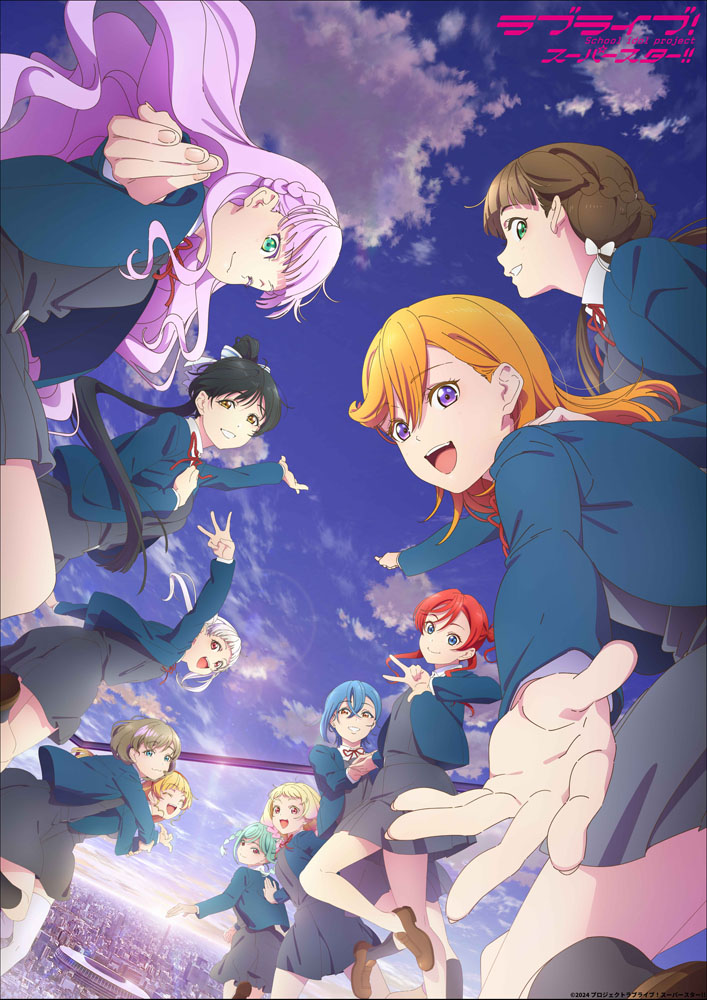
I personally found Superstar’s story to be a slow, yet rewarding experience. Just like Aqours, Liella! is shown to be a continuous presence, but unlike Sunshine’s prior core messages, the focus is less about the group, but more so on the experiences its characters learn from their time spent together to begin with.
From Past to Present to Future - Hasunosora’s Legacy
Hasunosora is arguably one of the more unique groups we'd gotten from the franchise. They were the ones who motivated me enough to write this article, and that's because their story deals with the core themes of that this blog post is trying to delve into.
For sake of being succinct, I'll try my best to explain Hasu's concept as simply as I can, however for more details about the group, I would highly recommend this video by online presence, NoodleGirl, where they explain Hasu's presence and overall influence as a Japan-exclusive series.
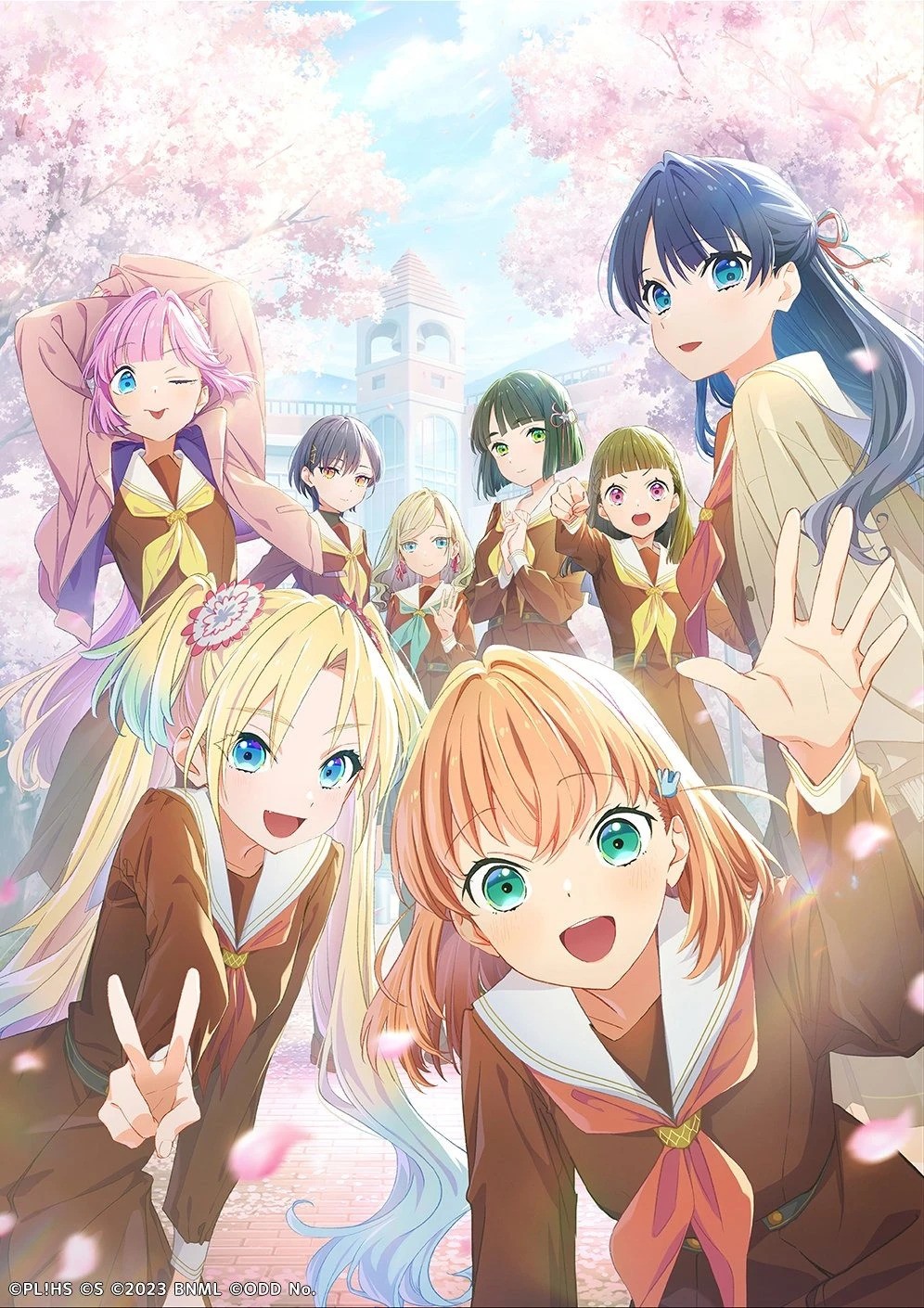
Hasunosora’s story is unique in that it's primarily told in real-time. It acts as the main story for the Japanese mobile game, Link! Like! Love Live!. As the game is a live-service project, this means that as time passes in the real world, so too does it continue for the Hasunosora cast as well. In fact, even as this article is being written, it's implied that the Hasunosora story is still continuing.
But what about its narrative?
The beginning of Hasunosora’s story begins with protagonist, Kaho, joining the esteemed boarding school of Hasunosora, where she's on a journey looking to be free of her once restricted lifestyle. Shortly after doing so, her Second Year Senior, Kozue, convinces her to join the School Idol Club. It's from here that new characters progressively join to create a group unlike any other seen before in the franchise.
Link! Like!’s 103rd Term (the first year of the story) covered the time Kaho spent as a First Year in school. From there, it stuck true to its realtime concept, eventually moving to the 104th Term after a year passed, where we saw Kaho move up a grade. In the same vein, so too did her senior Second Years become Third Years. In this way, its story was a much akin to Superstar's story - with the only difference being that the time between these jumps in grades felt much shorter as a result of being real-time.
And this very sentiment was shown even in Hasunosora's story itself. If you're wondering how, that's because the answer to Hasu foreshadowing its own core motifs was through one character alone - being Sachi.
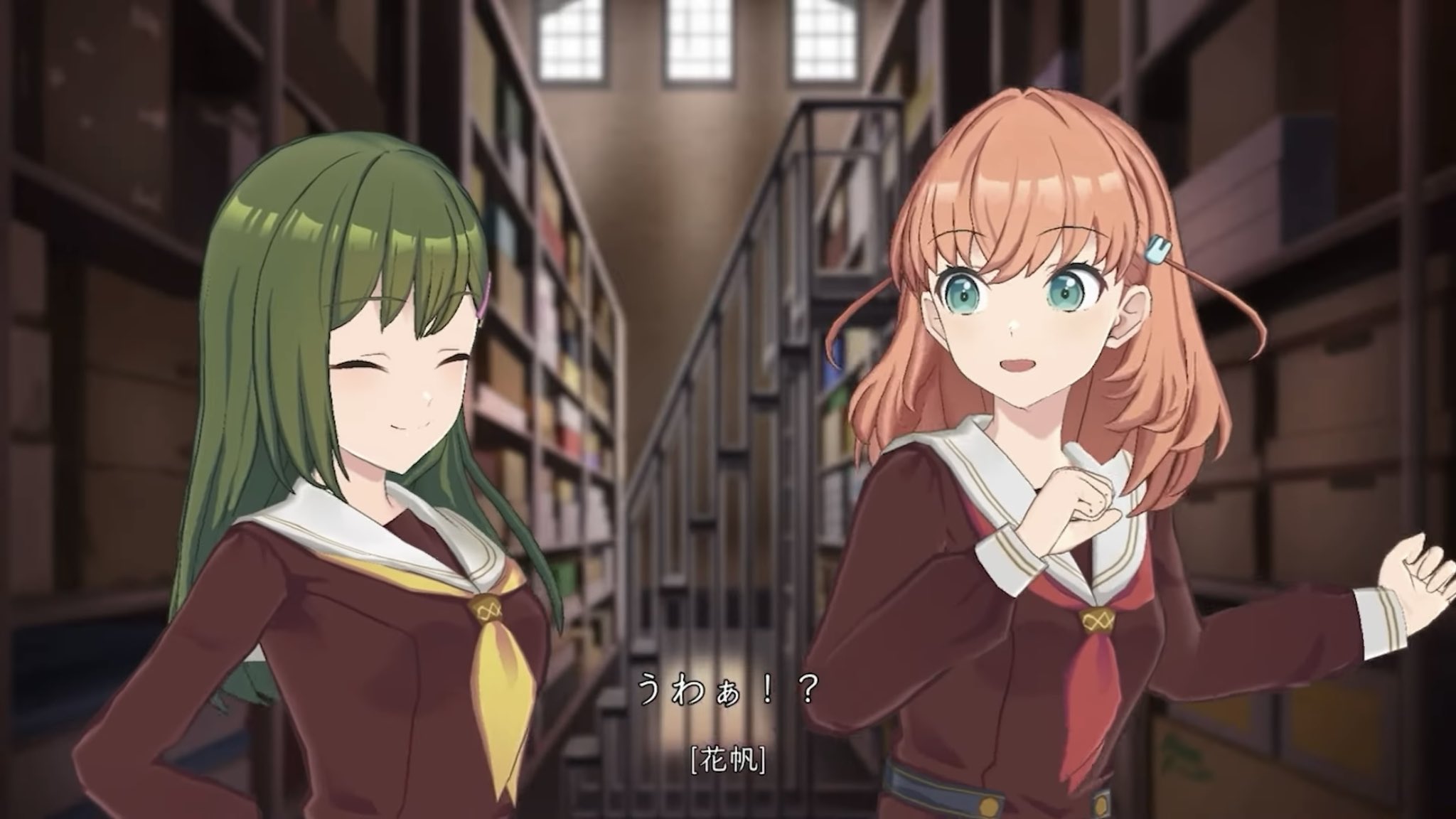
Sachi is an admittedly short-lived character. She appears only during the final stretch of Hasu's 103rd Term, serving as an ex-school idol Third Year character who supports Kaho and her friends from the shadows. She's a presence who slowly grows closer with the rest of the cast, despite not being internally involved with the main club.
Sachi is a character who's interesting, both because of her place in the story, alongside her relationship with Kaho's seniors during the start of the year. Tsuzuri, especially, has trouble accepting Sachi, leading to a dedicated episode of the two finally coming to terms with each other's circumstances. After finally reconciling her prior disagreements with her, though, there comes a time for peace. Unfortunately, said peace doesn't last for long.
Sachi's graduation draws close. Despite not being a school idol herself, Kaho and the rest of her friends find it in their hearts to honour her legacy, eventually bidding her goodbye towards the end of the 103rd Term. With everything said and done, she no longer appears in the story, but her memory lives on long after...
So why talk about Sachi?
Well, thus far, Hasunosora's fans have had just over two years to grow fond of its cast members. With the passing of time, however, comes the need to move on.
The announcements of the Third Year characters' graduations surprised many at the time of its announcement. Suddenly, even LL fans who never ever followed Hasu’s story became distraught over their leave. Some claimed it put them off from even wanting to begin it, while others said it left a bad taste in their mouth regarding the group's imagery as a whole.

Hasunosora’s final live stream to commemorate the Third Years came and went. Eventually, all that was left was the prospect of Kaho and her friends moving up a year. Soon, even Kaho herself would find herself facing the same circumstances as her seniors after becoming a Third Year herself. As of the time of me writing this article, Kaho has only just become a Third Year in Link! Like!'s story. Many have theorised that with Kaho’s graduation, the story of Hasunosora might come to an end - but this is, like all things, left ominously in the air until the it can be confirmed for certain.
What do I think of Hasunosora’s circumstances?
Here's a funny story: I'm not even caught up on the full Hasu story, so I probably can’t comment much on it to begin with (oops). The recent news of the older girls graduating blew up so much in online discourse that me eventually learning about it was an after-effect of the drama.
Even so, I am incredibly fond of its characters during the 10+ hours I've spent catching up to Hasu’s legacy. Of the entire cast, Tsuzuri, one of Kaho’s Third Year seniors, was my favourite of the cast - and she’d evidently been a fan favourite by many, due to her iconic design and silly manner of speech. Her being a senior, of course, meant that she would be one of the characters leaving as a result.
I also think that in the grander scheme of things, the Third Years' graduations was long foreshadowed. What was meant to be a goodbye to just on character, being Sachi, also served as an ominous reminder to Hasu's fans that time was merciless. Sooner or later, just like Sachi herself - Kozue, Megumi and Tsuzuri's time would surely come as well. But just like Sachi - we shouldn't dismay over it.
Instead, we ought to take after Kaho and her friends' example. We should remember the good times, the bad times, and the fond times. There's nothing wrong with reminiscing and remembering the memories you held dear. Even if you can't always see someone as often as you used to, that doesn't invalidate the impact they had on your life to begin with!
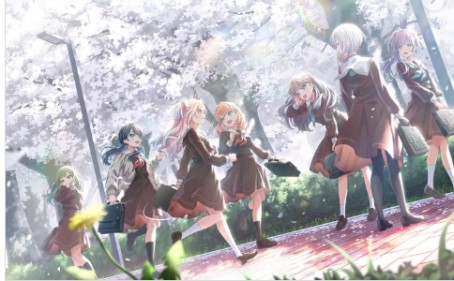
And it doesn't just end there - but it seems as if this live-format is developing into newer Love Live! projects as well...
Just like Hasu, the new Bluebird Project also follows a real-time concept
At the time of me writing this article, Love Live! Bluebird (BB) hadn’t been officially launched, but by the time it came out, I’d begun noticing patterns of BB, ironically enough, following the same thematic motifs as Hasunosora.

Interestingly, Bluebird’s group doesn't operate on a conventional basis. Instead, their focus thus far has primarily been active as a social media presence. Notably, all 10 of their primary characters have their own dedicated Twitter accounts, slowly allowing for a story to unravel as they post their daily happenings online for their fanbase to see. Speaking in all honesty, it's been fun (for the most part). Being able to keep an eye on each member's story while commenting for them to (theoritically) see has created a strange feeling of union amidst the fanbase.
Eventually, though, there was a recent post that ignited some anxiety within the western part of the fanbase.
This was when Bluebird's’s main lead, Polka, tweeted, celebrating another character’s birthday when the day arose. While it was celebratory at first, many gathered the impression that just like Hasunosora, BB were operating on a real-time basis. Just as quickly as it was tweeted out, some fans took to quote-retweeting it, voicing their worries about Bluebird's story following similar vein to Hasu.

Is there any merit to a real-time story in Love Live?
Part of why I take such a personal shine to Hasunosora and Bluebird’s narratives is because they've not been afraid so far to admit that they're continuous stories.
Even so, I've always admired stories for more than just their journeys, but also from the messages I could interpret from them as a viewer. I enjoy reading between the lines of these stories to search for nuance, and it's a huge reason I've adored seeing how Love Live!'s tackled shaking up its formulae.
Drawing a conclusion…

When I made this blog post, one thing was on my mind upon writing it: I wanted this webpage to act as my opinion piece regarding my thoughts about the series’ future. Because just like it's self-contained stories, we may never know where this franchise is headed until we wait to find out ourselves.
Of course, this simple little blog post became a lot more ambitious as I began writing it. Sticking to one theme got evidently, a little out-of-hand. Still, the point stands, though.
You can't change fate, you can never challenge growing up, and you certainly can't avoid time marching forward against your best wishes.
Love Live! has always been a franchise about moving forwards. It's a coming-of-age tale that's always tackled its concept in its own varied ways, whether it be through μ’s’ unchanging legacy, Aqours’ eternal presence, or through Liella! and Hasunosora’s ever-changing presence amidst the march of time.
If that's the case, it only means that goodbyes are inevitable. Watching Love Live! Sunshine, taught me that very same lesson during a time I had to learn to say goodbye to the things I once loved. Now, I feel like it plays a huge factor into why I love this series so much. It’s sad, but I completely understand why it works the way it does. If anything, it’s fated to happen.
And I do admit there are certainly MANY other factors playing here. Media, and the ways we, as individuals, interpret it, are always incredibly varied and complex. There are factors to consider, such as the parts of this series we find comfort in, the fact that the actors for these characters will soon say goodbye to their roles, and the eventual climax of less merchandise being produced once a set of characters say they due goodbyes. I am aware that while I'm accepting of these story decisions the series has made myself, there are many others who would be upset about it for different reasons. It's completely understandable, and I fully send my condolences.
But at the end of the day, I've always felt that it's not just about the experiences we've had with these characters, but also the lessons they taught us in preparation for that future ahead that's mattered. Just like Aqours' core motifs taught us - Love Live! is eternal, provided we have the right mindset for it.